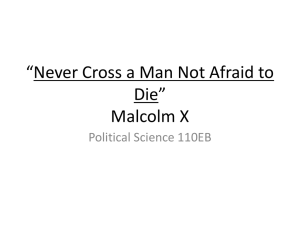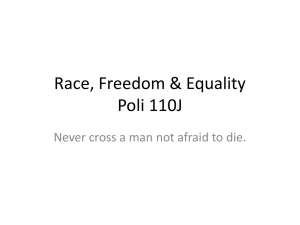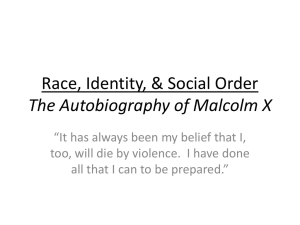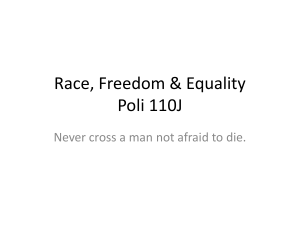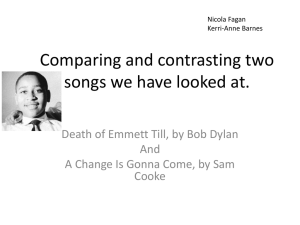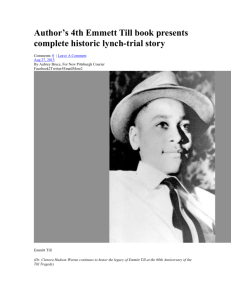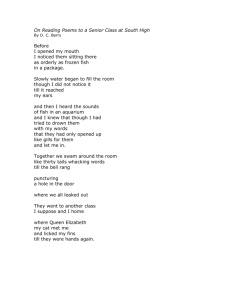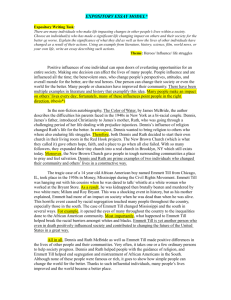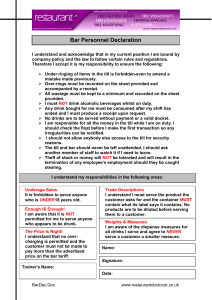Race, Freedom, & Equality Poli 110J 14
advertisement
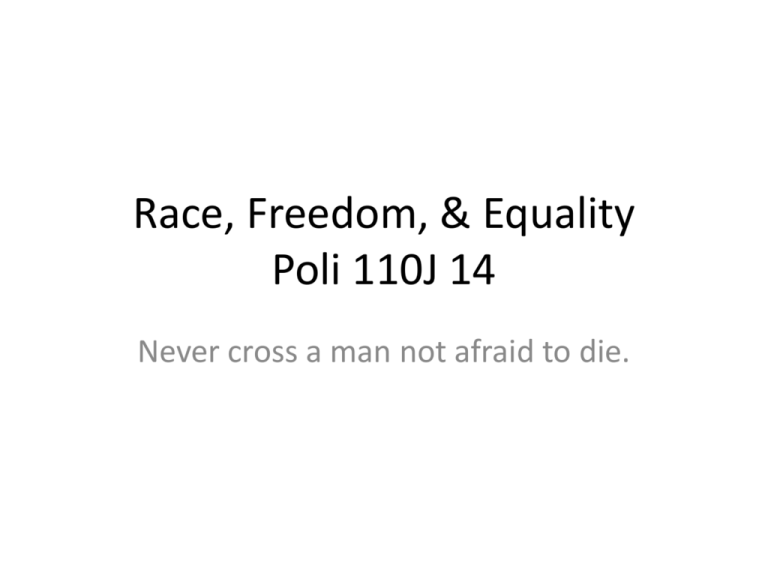
Race, Freedom, & Equality Poli 110J 14 Never cross a man not afraid to die. • • • • Essays 5-7 pages Due Thurs. Nov. 18 Additional TA office hours. • 1. Does Malcolm X’s Autobiography support or contradict Du Bois’ theory of the “talented tenth”? How, and to what extent? • 2. “Ginsberg’s poems ‘Howl’ and ‘Footnote to Howl’ are perfect illustrations of what Marcuse describes as Western totalitarianism.” To what extent, if any, is this statement true? • 3. “The Autobiography of Malcolm X is a perfect illustration of what Marcuse describes as Western totalitarianism.” To what extent, if any, is this statement true? • 4. Using Marcuse’s One-Dimensional Man as your source, critique one of the following texts: – – – – – Front section of New York Times or Wall Street Journal An episode of America’s Next Top Model Next episode of Gossip Girl One NFL game airing this Sunday Two hours of one cable news network (CNN, FOX, MSNBC) – Citations, sources, ads • Adult language advisory Emmett Till, 1941-1955 Emmett Till • Born in Chicago, visiting family (sharecroppers)in Money, Mississippi. • Mamie Carthan Till, mother, was worried that Emmett would not understand the differences between Chicago and the Mississippi Delta – “Mind your manners.” – Tensions on the rise after Brown v. Board of Education (1954) – The permanent awareness of existing within an actively hostile majority Emmett Till • Facts uncertain • At local grocery store, Till probably dared by friends to flirt with Carolyn Bryant, a 21 yearold white woman. – Whistled? (most probable) – Grabbed hand, asked for date? – Said, “Bye, baby.” on leaving? Emmett Till • One of friends runs off to tell Emmet’s cousin, Wheeler Parker, Jr. – Advised to get away fast – Parker on Till: “"He loved pranks, he loved fun, he loved jokes... in Mississippi, people didn't think the same jokes were funny." “ – All Delta natives know what can happen • The permanent threat of violence is a fact of life Emmett Till • Word spreads quickly among town’s whites • Bryant’s husband vows to “teach the boy a lesson” • At 12:30am, the Bryants, half-brother J.W. Milam, one other man drive to house of Rev. Wright, where Till was staying, take him away in the back of a pickup Emmett Till • • • • • Taken to a shed Beaten, skull fractured Eye gouged out Shot in the head Wrapped in barbed wire, bound to 70 lb. cotton gin fan, dumped in river Emmett Till • Mother demanded open casket funeral Emmett Till • NAACP leader Medgar Evars arrives to help investigate in face of police indifference • Murdered in Mississippi, June 12, 1963 by rifle shot to the head (Malcolm X: 1965, Martin Luther King, Jr.: 1968) • At trial, positive identification by witnesses, other black witnesses not even called • Some black witnesses arrested to prevent testimony • All white jury acquits Bryants, others, in 67 minutes – "If we hadn't stopped to drink pop, it wouldn't have taken us too long.” Emmett Till • After trial, Bryant & Milam admit to murder • Look magazine pays for interview. – They had meant to “just whip him... and scare some sense into him.” • Till: "You bastards, I'm not afraid of you. I'm as good as you are. I've 'had' white women. My grandmother was a white woman.” • Milam: “Chicago boy, I'm tired of 'em sending your kind down here to stir up trouble. Goddam you, I'm going to make an example of you -- just so everybody can know how me and my folks stand.'” • He was killed because he wasn’t afraid. – Link to interview, subsequent letters to the editor on website The Autobiography of Malcolm X • Read this text as an argument in the first person, not a personal affirmation – The claim is not that Malcolm X’s experience is remarkable, but that it is not • Malcolm Little Satan Malcolm X El-Hajj Malik ElShabazz • Atheist Nation of Islam Sunni Islam • Themes – Systematic racism – Degradation & dehumanization – Pervasive violence and domination – Self-loathing – Oppression of ideas – Liberating power of truth – Race consciousness – Dignity, honesty & order Systematic Violence • “When my mother was pregnant with me, she told me later, a party of hooded Ku Klux Klan riders galloped up to our home in Omaha, Nebraska, one night.” (3) – From even before the beginning Systematic Violence • Sundown Towns – No blacks allowed on streets after dark • Mother the product of rape by a white man • Father murdered by white supremacist Black Legion – Four of father’s six brothers killed by whites • Home burned to the ground by Black Legion – “The white police and firemen cam and stood around watching as the house burned down to the ground.” (6) Systematic Violence • Example of systematized racism: • Father’s skull crushed, laid across streetcar tracks and cut almost in half – Ruled a suicide • “How could my father bash himself in the head, then get down across the streetcar tracks to be run over?” (14) – Insurance won’t pay off – Family sinks into poverty Systematic Racism • Mother must raise eight children alone – Life of constant insult: living on charity and passing as white – Fired whenever it is discovered that she is black • Constant humiliation & degradation – Stress & shame causes mental illness – Family broken up by welfare agency • “The monthly welfare check was their pass. They acted as if they owned us, as if we were their private property.” (16) The oppressive power of names • “Soon, nearly everywhere my father went, Black Legionnaires were reviling him as an ‘uppity nigger’ for wanting to own a store, for living outside the Lansing Negro district, for spreading unrest and dissention among ‘the good niggers.’” (5) – Good = subservient – To want to live as a free & independent man is “uppity”, i.e. not to be permitted of black men. The oppressive power of names • “The white kids didn’t make any great thing abut us, either. They called us ‘nigger’ and ‘darkie’ and ‘Rastus’ so much that we thought those were our natural names. But they didn’t think of it as an insult; it was just the way they thought about us.” (12) – Internalizing the contempt of the oppressor – The contempt is casual, unthinking. So habitual that it isn’t even thought of as an insult. – Demonstrates the unquestioned systematization of white power – Part of Malcolm X’s goal is to reveal this power & strip it of it’s legitimacy The oppressive power of names • From his favorite teacher: “Malcolm, one of life’s first needs is for us to be realistic. Don’t misunderstand me, now. We all here like you, you know that. But you’ve got to be realistic about being a nigger.” – Systematic racial oppression seen as just the way it is. – As part of the racist system of oppression, things are The oppressive power of names • “A lawyer—that’s no realistic goal for a nigger. You need to think about something you can be. You’re good with your hands—making things. Everybody admires your carpentry shop work. Why don’t you plan on carpentry?” (43) – Don’t be what you are or what you can be, be what the system of racist oppression wants to make of you. The oppressive power of names • “Where ‘nigger’ had slipped off my back before, wherever I heard it now, I stopped and looked at whoever said it. And they looked surprised that I did. • “I quit hearing so much ‘nigger’ and ‘What’s wrong?’—which was the way I wanted it.” (44) Internalizing Contempt • For Malcolm X, the problem is not only oppression by white society, but its acceptance by blacks themselves. • “I actually believe that as anti-white as my father was, he was subconsciously so afflicted with the white man’s brainwashing of Negroes that he inclined to favor the light ones, and I was his lightest child.” (7) Internalizing Contempt • “I was among the millions of Negroes who were insane enough to feel that it was some kind of status symbol to be born lightcomplexioned—that one was actually fortunate to be born thus.” (5) Internalizing Contempt • “How ridiculous I was! Stupid enough to stand there lost in admiration of my hair now looking ‘white,’… I vowed that I’d never again be without a conk, and I never was for many years. • This was my first really big step toward selfdegradation: when I endured all that pain, literally burning my flesh to have it look like a white man’s hair.” (64) Internalizing Contempt • “In any black ghetto in America, to have a white woman who wasn’t a known, common whore was—for the average black man, at least—a status symbol of the first order.” (78) Internalizing Contempt • “They prided themselves on being incomparably more ‘cultured,’ ‘cultivated,’ ‘dignified,’ and better off than their black brethren down in the ghetto, which was no further away than you could throw a rock. Under the pitiful misapprehension that it would make them ‘better,’ these Hill Negroes were breaking their backs trying to imitate white people.” (48) Internaliz Contempt • “So many of those so-called ‘upper class’ Negroes are so busy trying to impress on the white man that they are ‘different from those others’ that they can’t see they are only helping the white man to keep his low opinion of all Negroes.” (123) – Division of the black community against itself – Identification with the oppressor – “White” understood to mean “better”, “black” to mean “worse” Dehumanization • “In the ghettoes the white man has built for us, he has forced us not to aspire to greater things, but to view everyday living as survival—and in that kind of community, survival is what is respected.” (105) – A life of oppression and brutality leaves the individual brutalized – In the absence of even the possibility of better things, Malcolm X at this point in his life embraces a form of nihilism. He sees his life of self-loathing, drugs, sex, and crime as self-degradation. – This is due in part to a lack of self-knowledge and selfrespect The color line • “We laughed about the scared little Chinese whose restaurant didn’t have a hand laid on it, because the rioters just about convulsed laughing when they saw the sign the Chinese had hastily stuck on his door: ‘Me Colored Too.’” (131) The color line • “Hymie really liked me, and I liked him. He loved to talk. Half his talk was about Jews and Negroes. Jews who had anglicized their names were Hymie’s favorite hate. Spitting and curling his mouth in scorn, he would reel off names of people he said had done this.” (143) • The race card: “Who in the world’s history has ever played a worse ‘skin game’ than the white man?” (206) • “She knew from personal experience how crime existed only to the degree that the law cooperated with it. She showed me how, in the country’s entire social, political and economic structure, the criminal, the law, and the politicians were actually inseparable partners.” (134) – No legitimate authority: Law, religion, society all complicit in racist oppression & hypocrisy • The curse of Ham Being toward death • “I believed that a man should do anything that he was slick enough, or bad and bold enough, to do and that a woman was nothing but another commodity.” (155) • “Deep down, I actually believed that after living as fully as humanly possible, one should then die violently.” (159) • “I lived and thought like a predatory animal.” (155) • “The white man is the devil.” • My mind “flashed across the entire spectrum of white people I had ever known; and for some reason it stopped upon Hymie, the Jew, who had been so good to me…. • I said, “Without any exception?” • “Without any exception.” • • • • • • • • • Black Legion Welfare officials Judges Teachers Cops Johns Customers Sophia Etc.
